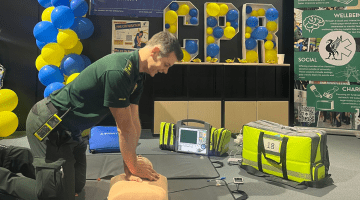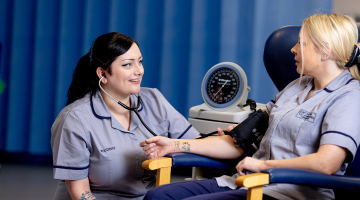Why study this course with LJMU?
- Open to current employees of participating organisations*
- Newly validated for 2024 with updated module design to ensure clinical relevancy
- Mix of Core (compulsory) and Option modules reflecting current workforce development needs
- Taught by Advanced Clinical Practitioners and subject experts
- Supports the development of autonomous, evidence-based and holistically patient-focused practitioners
- Underpinned by the four pillars of advanced practice: clinical practice, research, education, and leadership and management
- Postgraduate Taught Experience Survey (PTES) 2023 reports 100% of students find the course intellectually stimulating.
*If your organisation does not currently have a contract with LJMU to deliver this degree apprenticeship, please contact your Human Resources officer or NHS Trust training manager
Deadline for applications: 30th June 2025
About this course
Our MSc Advanced Clinical Practice masters apprenticeship allows you to individualise your postgraduate learning journey. Through a mix of core and option modules, reflecting a range of clinical specialties and areas of interest, you can tailor your study to best meet your career aspirations.
This two-year, part-time degree apprenticeship incorporates off-the-job learning to develop your knowledge, skills and the behaviours aligned to the Advance Clinical Practitioner apprenticeship standard (ST0564).
Year 1 of the degree apprenticeship consists of five core (compulsory) modules totalling 90 credits, with Introduction to the Principles of Advanced Clinical Practice as the initial module for all learners.
The following modules reflect each of the four pillars of advanced practice and are evenly weighted. This ensures that you gain a solid foundation of knowledge, skills and attributes in line with the Multi-professional Framework for Advanced Clinical Practice Capabilities (HEE, 2017), with the 'knowledge, skills and behaviours' of the Advanced Clinical Practitioner standard (ST0564) fully reflected.
In Year 2, you will undertake modules worth a further 90 credits, from a combination of core modules and two option modules (20 credits each). You can select either Independent and Supplementary Prescribing as an option module at the start of Year 2, or alternatively a module focussing on the development of advanced practice within your own area of specialist practice.
Following this, you will choose anther option module and undertake the development of your research inquiry.
The final element of the programme is a 20 credit integrated End-Point-Assessment module.
The programme is usually taught over one day a week. Year 1 is delivered on an alternate day to Year 2, providing flexibility within a full-time work basis.
Upon completing your degree apprenticeship, you will graduate with a Level 7 MSc Advanced Clinical Practice masters degree, totalling 180 credits.
Course modules
Discover the building blocks of your programme
In Year 1, all students will undertake five Core (compulsory) modules:
- Underpinning Principles of Advanced Clinical Practice
- Clinical Assessment and Decision Making
- The Research Pillar in Practice
- Multi-professional Leadership and Management
- Principles of Clinical Education and Supervision
This is followed by Option module choices in Year 2, which all have a contemporary focus within current healthcare needs.
Final modules are Core and reflect the requirements to embed learning within the pillars of Advanced Clinical Practice and a with a focus on demonstrating proficiency:
- Advanced Clinical Practice Inquiry
- Advanced Clinical Practice End Point Assessment (EPA)
Further guidance on modules
Modules are designated core or optional in accordance with professional body requirements, as applicable, and LJMU’s Academic Framework Regulations. Whilst you are required to study core modules, optional modules provide you with an element of choice. Their availability may vary and will be subject to meeting minimum student numbers.
Where changes to modules are necessary these will be communicated as appropriate.
Core modules
Optional Modules
Your Learning Experience
An insight into teaching on your course
Your modules offer a variety of teaching and learning approaches that are designed to engage and inspire you. These include lectures, seminars, group work activities, simulation and tutorials, both on-campus and online.
As you progress through the programme, you will develop and utilise progressively higher-order and mastery-level skills, as well as further developing subject specific knowledge. This will support you to become an inquiring and confident advanced practice learner, fostering independence in the acquisition, and application of, theoretical knowledge.
You will be:
- empowered to acquire knowledge through supported, independent learning. This will include being directed to scholarly activities that will prepare you for scheduled teaching activity.
- supported in engaging in online asynchronous activity. Examples include tutorial discussions, tutor-facilitated discussion boards and collaborative or individual projects, such as wikis, padlets, blogs and e-portfolios. While they may not always be present at the same times as the students, academic staff will be able to actively, iteratively and directly engage with you to facilitate and guide your learning.
How learning is monitored on your programme
To cater for the wide-ranging content of our courses and the varied learning preferences of our students, we offer a range of assessment methods on each programme.
You will usually undertake one assessment for each module.
Assessment methods will be authentic to practice, enabling you to demonstrate knowledge and competency, and replicate or further advance ‘real-world’ tasks that you might be expected to experience in your professional career.
To help you prepare for written, verbal, practical and examination assessment, you will be given the opportunity to practise the appropriate related skills throughout your modules.
Where you will study
The School of Nursing and Advanced Practice is based within Tithebarn Building, in the heart of Liverpool, and close to rail and bus public transport connections. It adjoins the Avril Robarts Library, which offers a wealth of learning and study support resources.
Course tutors

Joanna Lavery
Programme Lead
Joanna has been in post at LJMU since November 2019 and qualified as a registered nurse from LJMU in 1999. She has worked in neurology and neurosurgery, critical care, and worked in Australia within the speciality. On her return to Liverpool she embarked upon a role in the community as a District Nurse, gaining her SCPDN qualification, holding posts as a DN Care Manager and Community Matron, becoming involved in advanced practice and service development.
Joanna made the leap back into secondary care to work as an Advanced Nurse Practitioner in acute medicine, focusing on medical assessment and ambulatory emergency care. She enjoys teaching and helping others to advance their skills throughout all her nursing and academic roles. Joanna is now the programme lead for the Advanced Clinical Practice Apprenticeship programme and is a champion of the student experience and enhancing opportunities through widening participation in higher education.
-
 Lecturer/Senior Lecturer
Lecturer/Senior Lecturer -
 Lecturer/Senior Lecturer
Lecturer/Senior Lecturer -
 Lecturer/Senior Lecturer
Lecturer/Senior Lecturer -

-
 Lecturer/Senior Lecturer
Lecturer/Senior Lecturer
Career paths
Further your career prospects
LJMU has an excellent employability record with 96% (HESA 2018) of our postgraduates in work or further study six months after graduation. Our applied learning techniques and strong industry connections ensure our students are fully prepared for the workplace on graduation and understand how to apply their knowledge in a real world context.
The programme is designed to reinforce the graduate attributes required to progress within the NHS workforce. This programme enables graduate workers within the NHS and healthcare workforce to develop the knowledge, skills and attributes required to enhance their career development. It also reflects the need to support service demand within the NHS Long Term Workforce Plan (2023) across the healthcare sector with the growth of Advanced Clinical Practitioner training places being offered via an apprenticeship route.
Tuition fees and funding
- Degree Apprenticeship:
- £12,000
The University reserves the right to increase tuition fees in accordance with any changes to the maximum allowable fees set by the UK Parliament. In the event of such a change, any fee increase will be subject to a maximum cap of 10% of the total course cost as originally stated at the time of your offer.
Fees
The fees quoted at the top of this page cover registration, tuition, supervision, assessment and examinations as well as:
- library membership with access to printed, multimedia and digital resources
- access to programme-appropriate software
- library and student IT support
- free on-campus wifi via eduroam
Additional costs
Although not all of the following are compulsory/relevant, you should keep in mind the costs of:
- accommodation and living expenditure
- books (should you wish to have your own copies)
- printing, photocopying and stationery
- PC/laptop (should you prefer to purchase your own for independent study and online learning activities)
- mobile phone/tablet (to access online services)
- field trips (travel and activity costs)
- placements (travel expenses and living costs)
- student visas (international students only)
- study abroad opportunities (travel costs, accommodation, visas and immunisations)
- academic conferences (travel costs)
- professional-body membership
- graduation (gown hire etc)
Funding
There are many ways to fund postgraduate study for home and international students. From loans to International Scholarships and subject-specific funding, you’ll find all of the information you need on our specialist postgraduate funding pages.
Please be aware that the UK’s departure from the EU may affect your tuition fees. Learn more about your fee status and which tuition fees are relevant to you.
This is an apprenticeship route and funding will be provided through the Department of Education on successful appointment in a trainee Advanced Clinical Practitioner post through an NHS or other healthcare organisation.
Entry requirements
You will need:
Qualification requirements
How to apply
Securing your place at LJMU
To apply for this programme, you are required to complete an LJMU Degree Apprenticeship form. You will need to provide details of previous qualifications and a personal statement outlining why you wish to study this programme.
Your university life
From accommodation and academic support to clubs and societies. Find out what LJMU has to offer.
Talk to our students
Connect with a current LJMU student for advice and guidance on university life, courses and more.
See what our students are saying
At LJMU we want you to know you’re making the right choice by studying with us. You can see what our students are saying about their experience with us through their reviews on the following websites:
Related Links
News and views
Browse through the latest news and stories from the university
The University reserves the right to withdraw or make alterations to a course and facilities if necessary; this may be because such changes are deemed to be beneficial to students, are minor in nature and unlikely to impact negatively upon students or become necessary due to circumstances beyond the control of the University. Where this does happen, the University operates a policy of consultation, advice and support to all enrolled students affected by the proposed change to their course or module.






.png)







